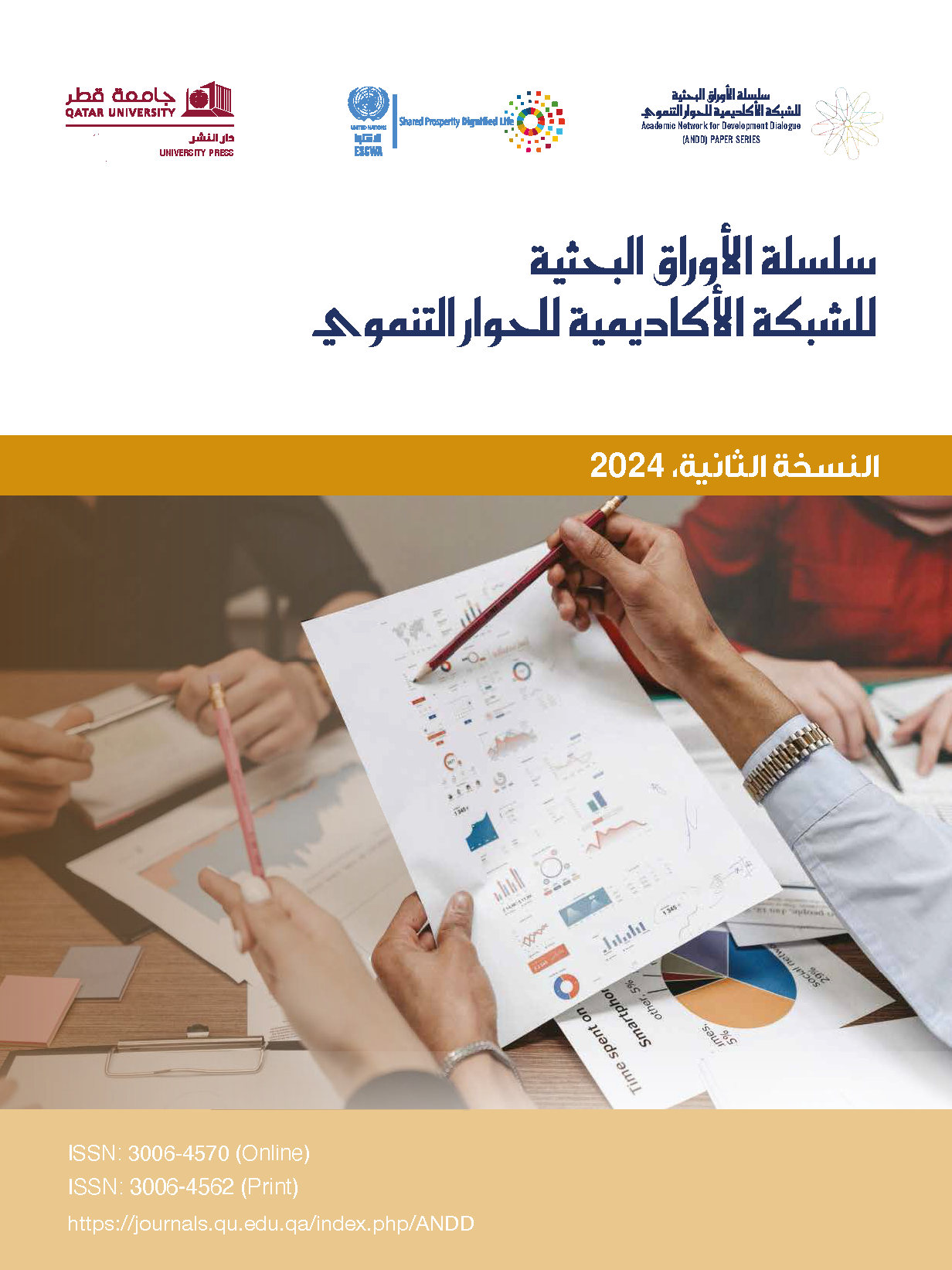تعزيز الصحة النفسية والرفاهية العاطفية داخل الصفوف الدراسية
الملخص
يسلط البحث الضوء على مدى إلمام المعلمين ووعيهم بالذكاء العاطفي والتعلم العاطفي الاجتماعي في المدارس في لبنان. كما يعنى بإبراز فوائد برامج التعلم العاطفي الاجتماعي من حيث خلق المساواة في المدارس وتعزيز روح الوعي الذاتي، وأهمية تزويد الطلبة بأدوات إدارة المشاعر والقدرة على بناء علاقات صحية طويلة الأمد وقائمة على التعاطف. أجري هذا البحث في لبنان من خلال مقابلات مجموعات التركيز والاجتماعات الفردية ، وقد استُخدم نموذج جوجل لاستطلاع آراء 104 مشاركًا. وشارك معلمون من محافظات وفئات عمرية مختلفة ويدرسون مراحل تعليمية متفاوتة، وفي مجالات متنوعة. يقدم البحث توصيات وإرشادات للمدارس التي تهدف إلى إدراج التعلم الاجتماعي العاطفي بشكل فعال في الصفوف الدراسية.
##plugins.themes.bootstrap3.article.details##
الكلمات المفتاحية
الصحة النفسيةالمهارات الاجتماعيةالرفاهية العاطفيةالذكاء العاطفي
المراجع
Aguilar, E. (2015). Teacher collaboration: The Key to Effective Teams in Schools: Emotional intelligence. Edutopia. George Lucas Educational Foundation. https://www.edutopia.org/blog/key-effective-teams-schools-emotional-intelligence-elena-aguilar
Boyatzis, R., & Goleman, D. (1999). Foundations of Emotional Intelligence with Richard Boyatzis and Daniel Goleman. Jossey-Bass.
Brackett, M. A., & Katulak, N. A. (2007). Emotional Intelligence in the Classroom: Skill-based Training for Teachers and Students. In J. Ciarrochi & J. D. Mayer (Eds.), Applying Emotional Intelligence: A Practitioner's Guide (pp. 1–27). Psychology Press.
Chernis, C., & Goleman, D. (2001). The Emotionally Intelligent Workplace: How to Select for, Measure and Improve Emotional Intelligence in Individuals, Groups and Organizations. Wiley Publications.
DePaoli et al. (2018). Respected Perspectives of Youth on High School & Social and Emotional Learning: A Report for CASEL. Civic with Hart Research Associates.
Dhingra, P., & Rani, R. (2019). Importance of Social Skills for Adolescents. https://doi.org/10.13140/RG.2.2.28711.50084
Durlak et al. (2017). Promoting Positive Youth Development through School-based Social and Emotional Learning Interventions: A Meta-Analysis of Follow-Up Effects. Child Development, 88(4), 1156–1171. https://doi.org/10.1111/cdev.12864
Goleman, D. (1995). Emotional Intelligence. Bantam Books.
–––. (1998). Working with Emotional Intelligence. Bantam Books.
Farrington, D. P., Ttofi, M. M., & Zych, I. (2019). Protective Factors Against Bullying and Cyberbullying: A Systematic Review of Meta-Analyses. Aggression and Violent Behavior, 45, 4-19. https://doi.org/10.1016/j.avb.2018.06.008
Matthews, G., Deary, I. J., & Whiteman, M. C. (2009). Emotional intelligence (EI) is a Relatively New Construct in Differential Psychology.
Mayer, J. D., & Salovey, P. (1997). What is Emotional Intelligence? In P. Salovey & D. Sluyter (Eds.), Emotional Development and Emotional Intelligence: Implications for Educators (pp. 3–31). Basic Books.
Petrides, K. V., Frederickson, N., & Furnham, A. (2004). The Role of Trait-Emotional Intelligence in Academic Performance and Deviant Behavior at School. Institute of Education, University of London, University College London, UK.
Qualter, P., & Gardner, K. (2007). Emotional intelligence: Review of Research and Educational Implications. Pastoral Care, 11-20.
Collaborative for Academic, Social, and Emotional Learning. (n.d.). https://casel.org
Boyatzis, R., & Goleman, D. (1999). Foundations of Emotional Intelligence with Richard Boyatzis and Daniel Goleman. Jossey-Bass.
Brackett, M. A., & Katulak, N. A. (2007). Emotional Intelligence in the Classroom: Skill-based Training for Teachers and Students. In J. Ciarrochi & J. D. Mayer (Eds.), Applying Emotional Intelligence: A Practitioner's Guide (pp. 1–27). Psychology Press.
Chernis, C., & Goleman, D. (2001). The Emotionally Intelligent Workplace: How to Select for, Measure and Improve Emotional Intelligence in Individuals, Groups and Organizations. Wiley Publications.
DePaoli et al. (2018). Respected Perspectives of Youth on High School & Social and Emotional Learning: A Report for CASEL. Civic with Hart Research Associates.
Dhingra, P., & Rani, R. (2019). Importance of Social Skills for Adolescents. https://doi.org/10.13140/RG.2.2.28711.50084
Durlak et al. (2017). Promoting Positive Youth Development through School-based Social and Emotional Learning Interventions: A Meta-Analysis of Follow-Up Effects. Child Development, 88(4), 1156–1171. https://doi.org/10.1111/cdev.12864
Goleman, D. (1995). Emotional Intelligence. Bantam Books.
–––. (1998). Working with Emotional Intelligence. Bantam Books.
Farrington, D. P., Ttofi, M. M., & Zych, I. (2019). Protective Factors Against Bullying and Cyberbullying: A Systematic Review of Meta-Analyses. Aggression and Violent Behavior, 45, 4-19. https://doi.org/10.1016/j.avb.2018.06.008
Matthews, G., Deary, I. J., & Whiteman, M. C. (2009). Emotional intelligence (EI) is a Relatively New Construct in Differential Psychology.
Mayer, J. D., & Salovey, P. (1997). What is Emotional Intelligence? In P. Salovey & D. Sluyter (Eds.), Emotional Development and Emotional Intelligence: Implications for Educators (pp. 3–31). Basic Books.
Petrides, K. V., Frederickson, N., & Furnham, A. (2004). The Role of Trait-Emotional Intelligence in Academic Performance and Deviant Behavior at School. Institute of Education, University of London, University College London, UK.
Qualter, P., & Gardner, K. (2007). Emotional intelligence: Review of Research and Educational Implications. Pastoral Care, 11-20.
Collaborative for Academic, Social, and Emotional Learning. (n.d.). https://casel.org
كيفية الاقتباس
كورونليان م. غ. . (2025). تعزيز الصحة النفسية والرفاهية العاطفية داخل الصفوف الدراسية . الشبكة الأكاديمية للحوار التنموي, 2(2). https://doi.org/10.29117/andd.2024.023
إصدار
القسم
الأبحاث باللغة الإنجليزية



 https://orcid.org/0009-0000-2729-8343
https://orcid.org/0009-0000-2729-8343